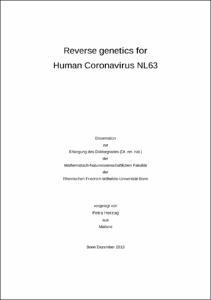Herzog, Petra: Reverse genetics for Human Coronavirus NL63. - Bonn, 2015. - Dissertation, Rheinische Friedrich-Wilhelms-Universität Bonn.
Online-Ausgabe in bonndoc: https://nbn-resolving.org/urn:nbn:de:hbz:5n-38387
Online-Ausgabe in bonndoc: https://nbn-resolving.org/urn:nbn:de:hbz:5n-38387
@phdthesis{handle:20.500.11811/6384,
urn: https://nbn-resolving.org/urn:nbn:de:hbz:5n-38387,
author = {{Petra Herzog}},
title = {Reverse genetics for Human Coronavirus NL63},
school = {Rheinische Friedrich-Wilhelms-Universität Bonn},
year = 2015,
month = jan,
note = {In 2004 a novel human coronavirus designated HCoV-NL63 was isolated in the Netherlands. The fact that it uses the same entry receptor as SARS-CoV could make HCoV-NL63 an important model for the identification of antiviral agents and the study of the pathogenesis of coronaviruses. The aim of this thesis was the construction and characterization of a novel reverse genetics system for HCoV-NL63. Initially the genome of the parental HCoV-NL63 stain Amsterdam 1 was sequenced and different cell cultures were tested for susceptibility to identify suitable cell lines for propagation of HCoV-NL63. Based on the discovery of a highly susceptible cell line, CaCo-2, a novel plaque assay for HCoV-NL63 was established. This plaque assay was optimized with regards to medium and incubation times. Repeated limiting dilution culture yielded a CaCo-2 adapted virus stock with increased replication and more pronounced plaque morphology as compared to the parental strain Amsterdam 1. The optimization of virus culture was essential for the construction and rescue of recombinant HCoV-NL63. Following a strategy of sequential assembly of pBelo BAC subclones, a stable, full-length infectious HCoV-NL63 cDNA clone was created. The cDNA clone served as template for phage promoter-driven in vitro synthesis of infectious RNA which is transfected into the cytosol of susceptible mammalian cells. Introduction of sequence alterations was enabled on subclone level. The straightforward subsequent construction of novel full-length cDNA clones enables future manipulations that help improving the understanding of viral gene functions. The novel reverse genetics system offers translational perspectives such as chimeric vaccine development and gene delivery. It will also be a valuable tool for future in vivo investigation of the pathogenesis conferred by HCoV-NL63.},
url = {https://hdl.handle.net/20.500.11811/6384}
}
urn: https://nbn-resolving.org/urn:nbn:de:hbz:5n-38387,
author = {{Petra Herzog}},
title = {Reverse genetics for Human Coronavirus NL63},
school = {Rheinische Friedrich-Wilhelms-Universität Bonn},
year = 2015,
month = jan,
note = {In 2004 a novel human coronavirus designated HCoV-NL63 was isolated in the Netherlands. The fact that it uses the same entry receptor as SARS-CoV could make HCoV-NL63 an important model for the identification of antiviral agents and the study of the pathogenesis of coronaviruses. The aim of this thesis was the construction and characterization of a novel reverse genetics system for HCoV-NL63. Initially the genome of the parental HCoV-NL63 stain Amsterdam 1 was sequenced and different cell cultures were tested for susceptibility to identify suitable cell lines for propagation of HCoV-NL63. Based on the discovery of a highly susceptible cell line, CaCo-2, a novel plaque assay for HCoV-NL63 was established. This plaque assay was optimized with regards to medium and incubation times. Repeated limiting dilution culture yielded a CaCo-2 adapted virus stock with increased replication and more pronounced plaque morphology as compared to the parental strain Amsterdam 1. The optimization of virus culture was essential for the construction and rescue of recombinant HCoV-NL63. Following a strategy of sequential assembly of pBelo BAC subclones, a stable, full-length infectious HCoV-NL63 cDNA clone was created. The cDNA clone served as template for phage promoter-driven in vitro synthesis of infectious RNA which is transfected into the cytosol of susceptible mammalian cells. Introduction of sequence alterations was enabled on subclone level. The straightforward subsequent construction of novel full-length cDNA clones enables future manipulations that help improving the understanding of viral gene functions. The novel reverse genetics system offers translational perspectives such as chimeric vaccine development and gene delivery. It will also be a valuable tool for future in vivo investigation of the pathogenesis conferred by HCoV-NL63.},
url = {https://hdl.handle.net/20.500.11811/6384}
}






